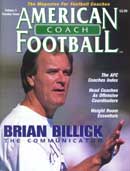AMERICAN FOOTBALL MONTHLY THE #1 RESOURCE FOR FOOTBALL COACHES
Article CategoriesAFM Magazine
|
Fulmer's WayTennessee's head man explains his career and program.by: Victoria Jacobs-Gray, Ph.D. © More from this issue In Knoxville, Phillip Fulmer Way intersects with Peyton Manning Pass right in front of the main entrance to Neyland Stadium. But, no one really needs directions to the famed shrine of college football that has seen Phil Fulmer emerge as one of the nation's top collegiate coaches. Tennessee appreciates their favorite son. His face graces the covers of books and magazines and now the street that leads loyal Volunteer fans to the football stadium has been renamed in his honor. The 1998 National Championship team at Tennessee was called a team with a destiny. Many writers predicted a rebuilding year, but Tennessee surprised the pundits with a perfect 13-0 season. Along the way, Coach Fulmer earned the titles of National Coach of the Year, and the Southeastern Conference Coach of the year. He has a 67-11-0 record with a 5-2-0 bo....The full article can only be seen by subscribers.
|
|
|||||||
| HOME |
MAGAZINE |
SUBSCRIBE | ONLINE COLUMNISTS | COACHING VIDEOS |
Copyright 2025, AmericanFootballMonthly.com
All Rights Reserved





